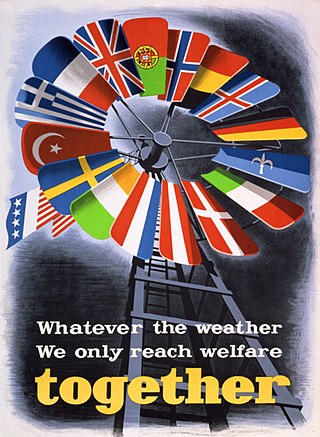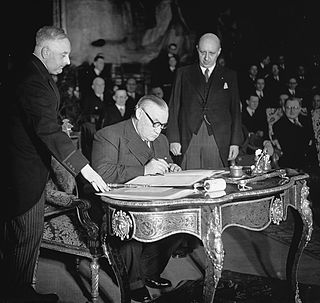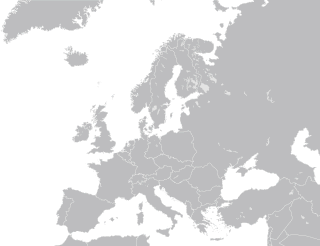
The North Atlantic Treaty Organization, also called the North Atlantic Alliance, is an intergovernmental military alliance of 32 member states—30 European and 2 North American. Established in the aftermath of World War II, the organization implements the North Atlantic Treaty, signed in Washington, D.C., on 4 April 1949. NATO is a collective security system: its independent member states agree to defend each other against attacks by third parties. During the Cold War, NATO operated as a check on the threat posed by the Soviet Union. The alliance remained in place after the dissolution of the Soviet Union and the Warsaw Pact, and has been involved in military operations in the Balkans, the Middle East, South Asia and Africa. The organization's motto is animus in consulendo liber. The organization's strategic concepts include deterrence.

The Euro-Atlantic Partnership Council (EAPC) is a post–Cold War, North Atlantic Treaty Organization (NATO) institution. The EAPC is a multilateral forum created to improve relations between NATO and non-NATO countries in Europe and Central Asia. States meet to cooperate and discuss political and security issues. It was formed on 29 May 1997 at a Ministers’ meeting held in Sintra, Portugal, as the successor to the North Atlantic Cooperation Council (NACC), which was created in 1991.
The Atlantic Council is an American think tank in the field of international affairs, favoring Atlanticism, founded in 1961. It manages sixteen regional centers and functional programs related to international security and global economic prosperity. It is headquartered in Washington, D.C. It is a member of the Atlantic Treaty Association.

Atlanticism, also known as Transatlanticism, is the ideology which advocates a close alliance between nations in Northern America and in Europe on political, economic, and defense issues. The purpose is to maintain or increase the security and prosperity of the participating countries and protect liberal democracy and the progressive values of an open society that unite them under multiculturalism. The term derives from the North Atlantic Ocean, which is bordered by North America and Europe.

The Common Security and Defence Policy (CSDP) is the European Union's (EU) course of action in the fields of defence and crisis management, and a main component of the EU's Common Foreign and Security Policy (CFSP).

Transatlantic relations refer to the historic, cultural, political, economic and social relations between countries on both side of the Atlantic Ocean. Sometimes it specifically means relationships between the Anglophone North American countries, and particular European countries or organizations, although other meanings are possible.

The Atlantic Treaty Association (ATA) is an umbrella organization which draws together political leaders, academics, military officials, and diplomats to support the North Atlantic Treaty Organization (NATO). The ATA is an independent organization that is separate from NATO.

The NATO Parliamentary Assembly serves as the consultative interparliamentary organisation for the North Atlantic Treaty Organization. Its current President is Michał Szczerba from Poland, elected in 2023. Its current Secretary General is Ruxandra Popa, who has been in this position since January 2020.

The German Marshall Fund of the United States (GMF) is a non-partisan American public policy think tank that seeks to promote cooperation and understanding between North America and the European Union.

The Treaty of Brussels, also referred to as the Brussels Pact, was the founding treaty of the Western Union (WU) between 1948 and 1954, when it was amended as the Modified Brussels Treaty (MTB) and served as the founding treaty of the Western European Union (WEU) until its termination in 2010. The treaty provided for the organisation of military, economic, social and cultural cooperation among member states as well as a mutual defence clause.
The Prague Security Studies Institute is a non-profit, nongovernmental organization established in early 2002 to advance the building of a just, secure, democratic and free-market society in the Czech Republic and other post-communist states. PSSI’s primary mission is to build an ever-growing number of informed and security-minded policy practitioners dedicated to the development and safeguarding of democratic institutions and values in the Czech Republic and its regional neighbors. PSSI works to identify and analyze select foreign policy and security-related concerns in transatlantic relations and other theaters of the world, propose sound, achievable policy responses and host regular roundtables and major conferences on these topics. PSSI is especially alert to the intersection of global finance/energy and national security considerations.
The Atlantic Community was a German-American project to apply Web 2.0 ideas to transatlantic foreign policy strategy. Launched in April 2007 as an undertaking of the Atlantic Initiative, the Atlantic Community aims at facilitating discussion between young thinkers and established members of the foreign policy realm in order to increase participation in a system that, in Europe, is often closed off to the public at large. The Advisory Board of the Atlantic Community is non-partisan, and includes journalist Marvin Kalb, UK Liberal Democrat Lord Wallace, and German diplomat Jürgen Chrobog as members. In January 2009 the Atlantic Community was selected as a "Landmark in the Land of Ideas" by Germany: Land of Ideas. Germany: Land of Ideas is a shared initiative of the German government, commerce, and industry under the patronage of former Federal President Horst Köhler.

The Western Union (WU), also referred to as the Brussels Treaty Organisation (BTO), was the European military alliance established between France, the United Kingdom (UK) and the three Benelux countries in September 1948 in order to implement the Treaty of Brussels signed in March the same year. Under this treaty the signatories, referred to as the five powers, agreed to collaborate in the defence field as well as in the political, economic and cultural fields.

In the United States, the Assistant Secretary of Defense for International Security Affairs or ASD (ISA) is the principal advisor to the Under Secretary of Defense for Policy (USD (P)) and the United States Secretary of Defense on international security strategy and policy on issues of Department of Defense (DoD) interest related to the governments and defense establishments of the nations and international organizations of Europe (including the North Atlantic Treaty Organization), the Middle East, Africa, and the Western Hemisphere. The ASD (ISA) also oversees security cooperation programs and foreign military sales programs in these regions. Despite the broad title of the office, the ASD (ISA) does not develop policy related to Asia, the Pacific region, Latin America, or South America.

From April 1948, the member states of the Western Union (WU), decided to create a military agency under the name of the Western Union Defence Organisation (WUDO). WUDO was formally established on September 27–28, 1948.

Monika Panayotova is a Doctor of Political Science, with interests in the field of the EU security and defence policy. Bulgarian politician – Monika Panayotova has been appointed as Deputy Minister for the Bulgarian Presidency of the Council of the EU 2018, responsible for the relations with the European Parliament during the Bulgaria's presidency since June 28, 2017.

NATO Defense College (NDC) is the international military college for North Atlantic Treaty Organization countries. It is located in Rome, Italy.

The history of the North Atlantic Treaty Organization (NATO) begins in the immediate aftermath of World War II when British diplomacy set the stage to contain the Soviet Union and to stop the expansion of Soviet power in Europe. The United Kingdom and France signed, in 1947, the Treaty of Dunkirk, a defensive pact, which was expanded in 1948 with the Treaty of Brussels to add the three Benelux countries and committed them to collective defense against an armed attack for fifty years. The British worked with Washington to expand the alliance into NATO in 1949, adding the United States and Canada as well as Italy, Portugal, Norway, Denmark, and Iceland. Greece and Turkey joined in 1952, West Germany joined in 1955, Spain joined in 1982, Czech Republic, Hungary and Poland joined in 1999, Bulgaria, Estonia, Latvia, Lithuania, Romania, Slovakia, and Slovenia joined in 2004, Albania and Croatia joined in 2009, Montenegro joined in 2017, North Macedonia joined in 2020, Finland joined in 2023, and Sweden joined in 2024.

The European Union (EU) and the North Atlantic Treaty Organisation (NATO) are two main treaty-based Western organisations for cooperation between member states, both headquartered in Brussels, Belgium. Their natures are different and they operate in different spheres: NATO is a purely intergovernmental organisation functioning as a military alliance, which serves to implement article 5 of the North Atlantic Treaty on collective territorial defence. The EU on the other hand is a partly supranational and partly intergovernmental sui generis entity akin to a confederation that entails wider economic and political integration. Unlike NATO, the EU pursues a foreign policy in its own right—based on consensus, and member states have equipped it with tools in the field of defence and crisis management; the Common Security and Defence Policy (CSDP) structure.

The Armenian Atlantic Association (AAA) is a non-governmental organization in Armenia. Founded in 2001, the organization promotes Armenia's Euro-Atlantic integration and seeks to further develop relations between Armenia and the North Atlantic Treaty Organization (NATO).
















